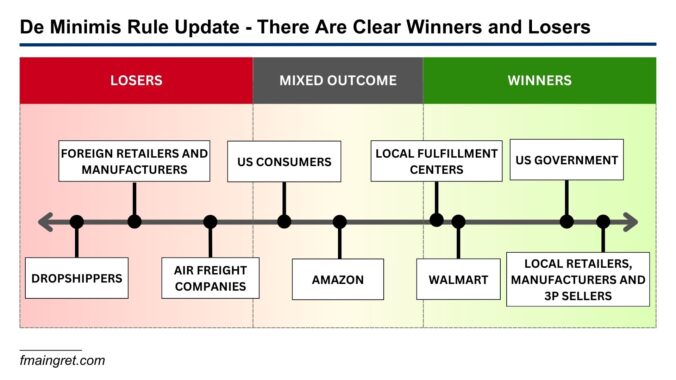Is this the end of $0.50 funny cat socks and $5 disposable dresses? There’s been a lot of buzz over the last year about the de minimis rule, which has been exploited by companies like Shein and Temu. Now, the Biden-Harris administration is pushing for new regulations.
It seems like a direct jab at the two Chinese giants, but these changes would affect a lot more players. How bad could it be for Temu and Shein? And who will lose or benefit from the elimination of the de minimis rule? Let’s find out.
The News : Potential Changes on the De Minimis Rule
In recent news, the Biden-Harris administration has plans to reform the de minimis exemption. They want to limit the types of goods eligible for this rule and increase shipment information requirements. These changes would block certain products from benefiting from the exemption and demand additional details like tariff classification numbers and compliance certificates. This comes in response to growing concerns about how the de minimis rule is being used by foreign companies—especially Chinese giants Shein and Temu—to avoid tariffs on low-value imports.
Section 301 tariffs (impacting around 40% of U.S. imports) would now prevent these products from using the de minimis exemption. The administration is also urging Congress to pass legislation, especially for industries sensitive to imports, like textiles and apparel. Key organizations such as the Retail Industry Leaders Association are backing these reforms. Additionally, the administration needs to address illicit shipments like fentanyl imports. While regulators have introduced several bills over the years to reform the rule, none have passed yet. The de minimis rule has been around for almost a century, but its use has skyrocketed with the rise of major Chinese online retailers.
The Losers
Foreign retailers and manufacturers
Obviously, if foreign retailers like Temu and Shein—though they aren’t the only ones—had to pay import taxes (currently around 12%) when shipping to the U.S., it would hit their revenues and margins. Changes to customs regulations could also disrupt supply chains, creating delays that would affect these retailers.
Does this mean the end of Shein and Temu in the U.S.? Not exactly. Even with a 12% import tax, these companies would still be price competitive. If they pass on the cost to customers, they might lose some, but they’ll likely remain cheaper than other retailers, even those selling on platforms like Amazon. Plus, both companies are diversifying their operations and supply chains, opening fulfillment centers and factories outside of China, including in the U.S.
Air freight companies
If new regulations cause a drop in shipment volumes from China to the U.S.—either due to reduced sales or shifts in fulfillment methods—air freight companies could see lower volumes and lower rates. According to a Forbes report in May, Temu and Shein ship about 9,000 tons of air freight daily from airports in southern China, which is the equivalent of 88 Boeing 777 flights. Though rates have dropped a little recently, they’re still double what they were in 2019.
US consumers
Even though some reports say consumers feel better about the economy, many are still struggling and are attracted to Temu and Shein’s low prices. Even high-income households shop with them, but those with less disposable income could start cutting back if prices rise in response to new regulations.
On the other hand, tighter rules could reduce safety risks and limit the distribution of illicit products. It might help for example the U.S. Customs and Border Protection intercept packages containing chemicals used to make fentanyl. Safety concerns have also been reported during manufacturing, with tests in South Korea finding that some Shein shoes exceeded legal limits for harmful chemicals, including a pair that had 229 times the legal limit for phthalates.
Dropshippers
Overall, I think those who will lose the most if there are changes on the de minimis rule are dropshippers who source their product in China. They were already struggling with low profit margins and higher acquisition costs, mostly due to pressure on price from companies selling directly through Temu or Shein. This change could be another nail in the coffin and make their model even less sustainable, unless they are operating within extremely specific niches that do not compete with large DTC brands or marketplace.
The winners
Local Fulfillment Centers
Removing the de minimis loophole could cause two things: 1) Local companies might become more competitive if Chinese sellers raise their prices, and 2) Chinese sellers might start fulfilling orders from local fulfillment centers rather than shipping directly from China. This would create opportunities for local 3PLs and other supply chain businesses involved in local distribution.
The US government
In addition to supporting local retailers and manufacturers, removing or limiting this loophole would allow the U.S. government to collect tariffs on a greater volume of imported goods. This could result in hundreds of millions of dollars in additional revenue annually, as more products would be subject to import taxes. Many products entering under the de minimis rule bypass customs checks, and changing this rule could make it easier for customs to detect unsafe or counterfeit items.
Walmart
If the U.S. eliminates the de minimis rule, this could be good news for Walmart as the price gap between its products and those from Temu and Shein could narrow. On the ecommerce side, Walmart doesn’t rely on goods shipped directly from China via small parcels, and these changes could make its marketplace more attractive to customers and 3P sellers.
Local retailers and manufacturers
Local retailers and manufacturers could also gain if Shein and Temu raise their prices. This would help level the playing field, boosting domestic competitiveness. However, I still think local businesses will likely still be at a price disadvantage, though more U.S. consumers could turn to buying locally-made products.
Mixed outcome : Amazon
In recent years, Amazon made it clear that they see Temu and Shein as a threat. And any regulation that could slow down these companies is a net benefit for Amazon. The giant relies on 3P sellers and local inventory to fulfill orders, which do not fall under the de minimis loophole. Retaining enough 3P sellers is key for Amazon and higher prices from Shein/Temu could help these sellers remain competitive.
On the other hand, this idea could speed up the implementation of alternative ways for Chinese retailers to distribute goods in the US. For example, Temu working more and more with local fulfillment centers could mean the company will drastically reduce their delivery times, one of Amazon’s greater strengths. Also, Amazon recently started to experiment with selling items directly from China, and changes in regulations could impact them as well on this new side of their business.
Conclusion
The proposed reforms to the de minimis exemption clearly target Shein and Temu, but they also affect other companies that use the rule to avoid tariffs on low-value imports. Removing the exemption and requiring more shipment information would impact both international and local retailers, U.S. consumers, and supply chain businesses.
While foreign retailers might face higher costs, I don’t believe this will be the end for them. In fact, it might push them to expand their U.S. operations. At the same time, the U.S. government would benefit from increased tariff revenue, though consumers might see higher prices. Air freight companies could lose out, and for Amazon, the outcome remains uncertain as this may trigger changes in Temu and Shein’s business models.
https://www.cnbc.com/2024/09/13/de-minimis-shein-temu-biden-china-rules.html
\https://www.supplychaindive.com/news/biden-harris-de-minimis-rulemaking/726955/
https://inc.com/bruce-crumley/sales-boom-for-shein-temu-sends-air-freight-rates-soaring.html

